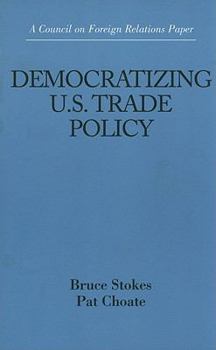Democratizing U.S. Trade Policy
The lack of political and public consensus over American trade policy plagues efforts to further liberalize trade and spur economic growth. To develop a trade policy with widespread support, the... This description may be from another edition of this product.
Format:Paperback
Language:English
ISBN:0876092822
ISBN13:9780876092828
Release Date:February 2002
Publisher:Council on Foreign Relations Press
Length:76 Pages
Weight:0.30 lbs.
Dimensions:0.3" x 5.4" x 8.3"
Customer Reviews
1 rating
Making the US trade policymaking process democratic
Published by Thriftbooks.com User , 17 years ago
The breakdown in consensus around the US trade agenda has brought the visions of business and labor in conflict risking the loss of benefit from ongoing trade liberalization. Since the partisan and one-sided wrangling in US Congress about the merits and demerits of trade cannot be won, there is a need for "further democratization of US trade policy" (p. 14). This paper - Democratizing US trade policy - looks at the need for a change, its challenges and prospects. There is a need for a change because trade policy-making is presently unable "to broker a compromise" between unfettered trade beloved by the business community when it is in a winning position, and almost always bemoaned by labor for fear it will lead to domestic job loss to foreigners. A new approach is necessary for the national good since, as the US economy globalizes, many an American life increasingly depend on the global economy. At this same the American populace is conflicted about trade, not so much about its beneficial impacts, but more so about its corresponding costs and whether or not they can be justified. Obviously it is good to wear nice shoes for a penny; it is quite a different thing if an American worker loses his/her job because of it, or a poor foreign worker is exploited by sweatshops to produce a cheap shoe. This book sees four steps that must be taken toward democratizing US trade policy: (a) giving equal weight to globalization, and stressing fairness in the distribution of the net gains from globalization; (b) increasing the number of stakeholders in the policy-making process; (c ) opening up the policy process to the public (transparency); and (d) making the process consistent with national interest (accountability). The four steps together suggest that successful policy is a function of process. The process depends on power and authority, i.e., power to decide, power to be present , and power to be represented. Historically authority has alternated between the US President and US Congress, with the effect that "there have been periods of both close institutional cooperation and increased friction" (p.12). Recently there has been more discord than cooperation both across political parties and between the President and Congress. Moreover, the domestic policy process has evolved along with changes in the international process. One can argue that US domestic trade policy is a function of both the domestic and international processes. If the democratization of US trade policy depends on domestic and international authorities, how can the balance be redressed? Domestically that is a very difficult question to answer because Congress has constitutional authority over international commerce, while the President has influence through his Trade Representative. The authors offer three possible solutions: (a) establishing a congressional trade office, instead of the costly committees that Congress normally uses; (b) appointing congressional trade advisers; and (c )





